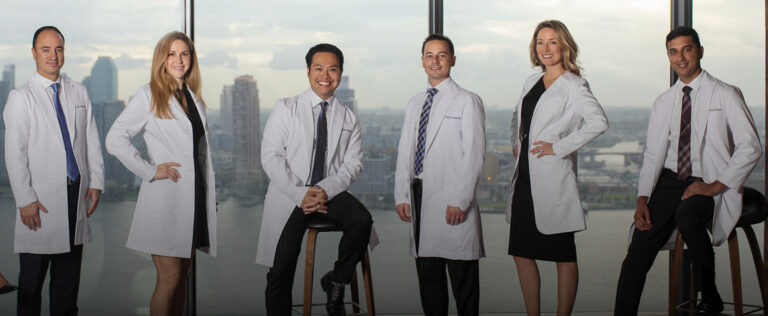Knee Surgeon NYC | Conservative Treatments By Top Doctors
If you are suffering from knee pain, you might consider visiting orthopedic surgeons in NYC. However, many orthopedic surgeons are quick to suggest surgery as their only treatment option. Surgery can carry risk, reliance on medication and long recovery periods.
Before you visit a surgeon, consider a visit with a joint and back pain specialist. These are doctors who have years of training in non-surgical options. They use advanced technology such as stem cells, PRP (platelet rich plasma) and viscosupplementation to relieve pain while avoiding the risks associated with surgery. We’ll review treatment options, common symptoms of knee pain, potential causes of pain and risk factors in order to help you.

The Best Alternatives to a Knee Pain Surgeon in NYC
At the pain treatment clinic and the Vein Treatment Clinic and Pain Treatment Specialists, our medical staff offer treatments that a standard knee surgeon NYC may not offer. Our pain doctors in New York includes Dr George Hanna who is an expert in pain management. A top pain doctor in New York and New Jersey is Dr Michael Nguyen who is specialized in pain management anesthesiology. Our physicians offer many effective, non-invasive treatment options. These include:
1. Genicular Nerve Block
A genicular nerve block is a safe and highly effective procedure to reduce knee pain. The genicular nerve lies at the junction between the femur and the lateral epicondyle in your knee. A genicular nerve block procedure is when your pain doctor administers a local anesthetic to block the nerve pain that is occurring in your knee. A genicular nerve block also works by diagnosing knee conditions and knee injury. It can determine if changes in your body (arthritis, inflammation etc) within your knee are causing the knee pain.
First, you will be placed on the procedure table. Your pain doctor will administer a substance such as chlorhexidine or iodine to sterilize the area. Your area of pain is then injected with the anesthetic to numb the pain and a needle is then inserted into the area. Sometimes, your pain doctor will use X-ray guidance to ensure the needle is inserted near the genicular nerve. Your pain doctor will then inject more local anesthetic to numb the nerve. This procedure will be repeated in many areas around the knee to block all genicular nerves.
This is a great alternative to orthopedic surgery because it is minimally invasive and provides effective pain relief. Our specialized pain doctors can provide instant pain relief without reliance on long-term narcotics or lengthy recovery times associated with unnecessary knee surgery.
2. Platelet-Rich Plasma (PRP)
PRP procedures are another great way to avoid unnecessary orthopedic surgery and subsequent orthopedic care. It has minimal risk and low pain associated with the procedure. The procedure works by injecting PRP into the area of pain to encourage new tissue to form in the injured area.
Our blood contains growth factors that help to regenerate new cells and tissue. A specialized pain doctor injects these growth factors into the knee. These growth factors interact with cells in the knee that is causing pain and tells them to begin cell division. This helps with the formation of new tissue in the knee to reduce pain and inflammation.
During the procedure, your specialized pain doctor will take blood from your arm. They will then put your blood into a device called a centrifuge. The centrifuge’s job is to categorize your blood cells into red blood cells, white blood cells, platelets and plasma. Your pain doctor will then use this sample to extract the relevant PRP. Your knee will be numbed with a local anesthetic and the PRP will be injected into the area of pain. It is important that a specialized pain doctor assesses your suitability for PRP and allows you to rest after this procedure.
PRP is a great alternative to knee surgery. Recovery time will be significantly shorter compared to surgical outcomes from orthopedic practice. PRP also avoids long-term reliance on medication for pain relief. Having a consultation with a specialized pain doctor can offer further information about the best treatment options for your knee pain.
3. Viscosupplementation
Viscosupplementation is another effective, conservative treatment alternative to knee surgery. This procedure provides longer-term pain relief and improvement in knee function. It may even slow down the rate of osteoarthritis!
Viscosupplementation works by injecting a lubricating liquid (hyaluronic acid) into the knee joint to help the existing liquid in the joint. Hyaluronic acid is a key component of joint fluid and provides our joints with their slippery surface to facilitate movement. This is very important because having healthy joint fluids allows the cartilage on our bones to glide past one another. This reduces joint friction and subsequent pain. Healthy levels of joint fluid are also important for ensuring that our bones and joints are well-cushioned when doing activities of high impact (like weightlifting).
During this procedure, your specialized pain doctor will inject the viscosupplementation directly into the joint capsule. This will provide you with longer-term pain relief and better joint function without the difficulties associated with surgery. Whilst some knee surgeons in NYC will advocate surgery for knee conditions, it is important to consult a specialized pain doctor to explore all conservative treatment options.
4. Steroid Knee Injection
Steroid injections provide immediate pain relief with minimal discomfort. Many patients find that orthopedic surgeons are quick to suggest surgical options as part of their treatment plan. However, there are many reasons to choose steroid injections as an effective form of pain relief.
Steroid injections contain anti-inflammatories called corticosteroids. During a steroid knee injection, your specialized pain doctor will sterilize the area of pain. Your pain doctor will then inject you with a local anesthetic to numb the area of pain. You will then be injected with these corticosteroids into the area of pain to provide immediate and effective pain relief. After this procedure, you should allow yourself to rest to ensure the inflammation reduces.
As a minimally invasive alternative to knee replacement surgery and other types of orthopedic surgery, steroid injections provide fast pain relief in a localized area of pain. Recovery time is quick with no need for reliance on oral pain medications for substantial periods of time.
Our Harvard-trained team of specialized pain doctors at the pain treatment clinic and the Vein Treatment Clinic and Pain Treatment Specialists. can provide information about the best treatment options for you. They are highly experienced in providing successful and non-invasive pain relief in our state-of-the-art facilities.
Knee Pain Symptoms
Knee pain symptoms can result from a knee injury or knee conditions. The symptoms will vary from person to person and the causes for pain can affect how each person experiences pain. Common symptoms include:
- constant ache
- shooting pain when knee is in use
- a burning sensation in the knee
- swelling and pain
- pain when the knee is touched
If you are experiencing any of the above symptoms, make sure you visit a specialized pain doctor. Our highly-trained team of Harvard doctors can provide a thorough consultation and explanation of treatment options.
What causes knee pain?
Our knees are important joints. They enable us to straighten, bend, and hold our body weight. Our knees are ball-and-socket joints which means that they help us to twist and rotate. In order to do this, our knee joints are made up of different structures including bones, ligaments, tendons and cartilage.
Many people experience knee pain that can go away. However, chronic knee pain will rarely get better without treatment intervention. Some of the most common causes of knee pain include:
- osteoarthritis – pain and inflammation caused by degeneration and deterioration of the joint. This is commonly experienced by older individuals.
- rheumatoid arthritis – a chronic autoimmune inflammatory disorder which can cause swelling and pain at the joints. This can eventually create deformity and bone erosion.
- patellar tendinitis – pain experienced on the front of the knee that is made worse by climbing and exercising.
- bursitis – an inflammation caused by overuse or injury of the knee e.g. individuals who do a lot of exercise.
- meniscus tear – occurs when the cartilage in the knee ruptures
- torn ligament – a tear in one of the four ligaments of the knee
It is important to receive a consultation with a specialized pain doctor when seeking information about treatment options. We offer a highly-specialized team of Harvard-trained doctors who combine their knowledge and experience in pain management to achieve successful outcomes.
Risk factors for knee pain
Having discussed the possible causes of knee pain and associated symptoms, it is important to consider risk factors that may increase the likelihood of developing knee pain:
- age – older individuals are more at risk of wear and tear in addition to developing arthritic joints
- previous injury or trauma to the knee – this can make the joint weaker and more susceptible to further damage
- physical exercise – overuse of the knee can lead to inflammation of the joint
- obesity – individuals who are overweight put more pressure on their knees
Conservative treatments
Your knee surgeon NYC or orthopedics knee doctor may be quick to offer only surgical options. As we have seen, there are many non-surgical treatment options that your pain doctor can offer you. Conservative treatments provided by the pain treatment clinic do not rely on risks associated with open surgery and long-term reliance on narcotics.
It is important to ensure that you discuss non-surgical treatment options with your pain doctor. During a consultation, your pain doctor will learn about your medical history and risk factors before establishing the nature of your pain and a treatment plan for you.
Meet our specialized medical team!
If you’re looking for an exceptional pain doctor in New York, consider Dr George Hanna.
Additionally, check out our excellent pain doctor in New York and New Jersey, Dr Michael Nguyen.
Contact us today!
At our clinics, you will receive extremely high levels of patient care. We offer excellent facilities, triple Board Certification and a team of Harvard-trained specialized pain doctors.
The pain treatment clinic has locations in both Manhattan, New York and Clifton, New Jersey. Our website details information and how to book your consultation with our highly-trained team!
Alternatively, you can also find out more information from our group of physicians based at the Vein Treatment Clinic and Pain Treatment Specialists.

